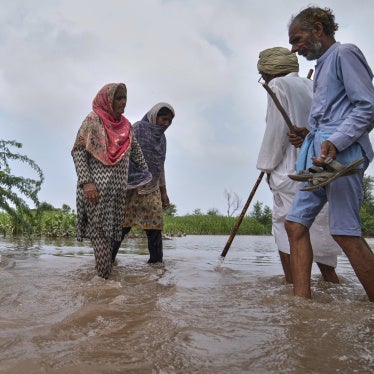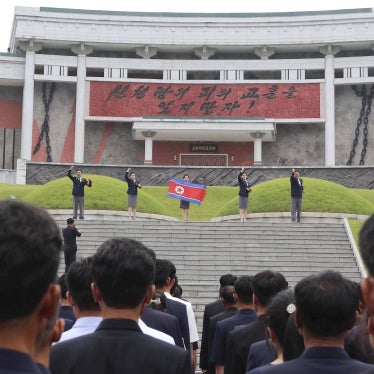Dear Prime Minister Morrison,
I am writing to you on behalf of Human Rights Watch regarding the Inspector General of the Australian Defence Force Afghanistan Inquiry report recommendations ("the Brereton report") and the establishment of an Office of the Special Investigator.
We were glad to see that the report, made public on November 19, 2020 was detailed and that in releasing it you and Gen. Angus Campbell made public apologies to the people of Afghanistan for the acts described in the report.
As you are aware, the Brereton report found credible information of 23 incidents of unlawful killing of 39 people "by or at the direction of members of the Special Operations Task Group, in circumstances which, if accepted by a jury, would be the war crime of murder." The alleged crimes included extrajudicial executions and other possible violations of international humanitarian law. These findings require prompt, independent, and impartial criminal investigations.
Office of the Special Investigator
In this regard, we welcome the Australian government's recent decision to establish the Office of the Special Investigator to gather evidence of possible crimes committed and to refer cases for prosecution as appropriate.
In order to conduct its work fairly, effectively and efficiently, we believe the government should ensure that the special investigator's office is adequately resourced, has the requisite authority to fulfill its mandate, is independent from both military and political influence, and be authorized to investigate all those in the chain of command implicated in these abuses.
Investigating past crimes in another country is a difficult, complex, and costly exercise. As such, the government should ensure that the special investigator's office is equipped with adequate resources and staff to carry out its important work, including relevant experts, analysts, and translators. In addition, the office should have clear legal authority to obtain evidence and summon people for questioning and arrest. The government should also provide the office the necessary tools to ensure that proper protection measures can be put in place to minimize any risks for potential witnesses to crimes. Overall, the special investigator's office should be protected against interference in its operations, including its budget, and obstruction of justice, as with other criminal investigations.
The Brereton report notes that, "the criminal behaviour described in this Report was conceived, committed, continued, and concealed at patrol commander level, and it is overwhelmingly at that level that responsibility resides." However, the Office of the Special Investigator should have authority to investigate up the chain of command since civilian officials and military commanders can be held criminally liable as a matter of command responsibility if they knew or should have known about violations committed by forces under their control and failed to prevent them or punish those directly responsible. Command responsibility has been incorporated into Australia's Law of Armed Conflict Manual (2006)[1] and Criminal Code Act (1995).[2] We welcome your comments on November 27 that "it's important that not only is there accountability in the defence forces for individual alleged acts, but also in the chain of command.”[3]
We note that the Brereton report recommends that immunity from prosecution should be offered to certain soldiers in exchange for their evidence to assist prosecutions. Any immunity provided should be consistent with the obligation of states under international humanitarian law to investigate and appropriately prosecute war crimes by their forces or under their jurisdiction. International law prohibits amnesties for war crimes.
Reparations
We are troubled by your comment that compensation for Afghans who were harmed by these incidents was not being considered by the government at this stage.[4] International humanitarian law affords victims the right to adequate, effective, and prompt reparation for harm suffered, and obligates states to provide such reparation to victims for acts or omissions which can be attributed to the state and constitute serious violations of international humanitarian law. It does not require that there be a criminal conviction. The Brereton report recommended that "in cases where it has found that there is credible information that an identified or identifiable Afghan national has been unlawfully killed, Australia should now compensate the family of that person.”
Making prompt payments to the victims or their families is in Australia's interest. As the Brereton report notes, "Doing so will contribute to the maintenance of goodwill between the nations, and do something to restore Australia's standing, both with the villagers concerned, and at the national level. But quite aside from that, it is simply the morally right thing to do."
The Australian government should provide adequate and swift reparations to the Afghan victims of abuses and their families. It should both proactively pay reparations for those where abuses have been found, and also ensure Afghans can effectively bring civil claims concerning abuses in Australian courts.
Whistleblowers
Finally, the Attorney-General's Department should drop the prosecution of former military lawyer and whistleblower David McBride. McBride's disclosures have been vindicated by this report and his continued prosecution is a chilling warning to others who may wish to come forward. As the Brereton report notes, "Too often, not only in the military, have the careers of whistle-blowers been adversely effected. Perhaps the single most effective indication that there is a commitment to cultural reform is the demonstration that those who have been instrumental in the exposure of misconduct, or are known to have acted with propriety and probity, are regarded as role models. It is crucial that their careers be seen to prosper."
We would be happy to discuss these matters further with you and your staff.
Sincerely,
Elaine Pearson
Australia Director
Human Rights Watch
CC:
Lynda Reynolds, Defence Minister Christian Porter, Attorney General
General Angus Campbell, Chief of the Defence Force
---
[1] International Committee of the Red Cross, IHL Database - Customary IHL, "Australia: Practice Relating to Rule 153. Command Responsibility for Failure to Prevent, Punish or Report War Crimes," undated, https://ihl-databases.icrc.org/customary ihl/eng/docs/v2cou au rule153 (accessed December 3, 2020).
[2] Ibid.
[3] Prime Minister of Australia, "Interview with Neil Breen, 4BC," November 27, 2020, https://www.pm.gov.au/media/interview neil-breen-4bc-3 (accessed December 3, 2020).
[4] Prime Minister of Australia, "Virtual Press Conference," November 21, 2020, https://www.pm.gov.au/media/virtual-press conference (accessed December 3, 2020).








